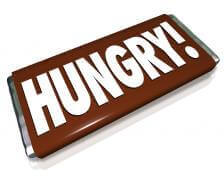I Can’t Stop Eating: 6 Tips to Beat the Binge
The Savvy Psychologist received a touching email from an anonymous listener who is facing a challenge many of us can relate to: she can’t stop eating. For her, and all of us who have ever felt powerless against food, here are 6 tips to battle binge eating.
Ellen Hendriksen, PhD
Listen
I Can’t Stop Eating: 6 Tips to Beat the Binge
Dear Savvy Psychologist,
I can’t stop eating. Like crime, my eating mostly happens at night. By the light of day, I have an exemplary diet. But after work or after dinner, I find myself in the pantry, funneling cookies straight from the sleeve. Last night I ate a pound of chocolate, a bag of maple-glazed nuts, and a box of cookies.
While it’s happening I’m not even in control. The cookies call to me and before I know it, I go numb and something automatic takes over. It’s like my body has been hijacked. I feel a mixture of denial and release while it’s happening, but afterwards I hate myself. I feel spent, guilty, and helpless. I think terrible things about myself, like how my husband would be better off married to someone else, how I’m messing up my life, and how there is no hope for me. Did I mention I hate myself? My last physical even showed that my blood sugar is in the pre-diabetes’ range. But I still can’t stop.
I’ve tried all the tricks: use a smaller plate, only eat when sitting at a table, don’t eat after 8pm, go for a walk instead, and on and on and on. Don’t tell me to try a substitute activity like knitting or some other garbage. I have yards of badly knit scarves to show for my efforts.
I’m married to a wonderful man—I daresay my soulmate—but he’s away for long stretches at a time for his job. Since college, I’ve drifted from one job to another; I get really excited about them at first but then the shine wears off and I get bored. I’ve worked in a hodgepodge of fields: I’ve been an assistant shoe designer, worked on a TV show, helped manage a boutique gym, and worked at a tech startup. But I can never seem to find a place I fit, and in the meantime, I feel like I’m being left behind. I’m worried I’ll never find my niche and I’ll never accomplish anything.
Something is terribly wrong with me. What is it and how to I fix it? Whatever it is sure isn’t being fixed by the chocolate.
Sincerely,
I Can’t Stop Eating
.

Thank you for your brave and honest email. I can hear your frustration and despair. But the fact that you are reaching out means you have hope and there is hope.
You are far from alone in this: 11% of your fellow women and 7.5% of men say they’ve binged in the last month.
While disordered eating starts in many ways: a remark from an authority figure about your body, an angst-ridden teenage decision to lose weight, or as a reaction to an upheaval in life—for you, perhaps getting uprooted after college—disordered eating sticks around through strict manipulation of food and how one deals with stress and negative emotion.
There’s no surefire regimen for stopping binge eating. Indeed, as we’ll see, oftentimes regimens—well-intentioned but rigid diet rules (no eating after 8 PM, for example) and equally rigid thinking about yourself, the world, and your future, are the true adversaries.
See also: Do You Have a Body Image Disorder?
To that end, here are 6 tips to try out. Do what works for you, and let the rest go:
Tip #1: Feel what you feel. This is the best and scariest thing you can ever hope to accomplish. Along with stuffing chocolate, I imagine you may be stuffing loneliness when your soulmate is thousands of miles away, resentment that all you get is a goodnight email, hopelessness that you will never find your niche, and insecurity about being left behind.
Your body is telling you everything is not OK. Feel what you feel. Discharge your feelings into a journal, even if you just write expletives in big black letters across both pages. And you know what? It’s not pleasant, but you can handle it. Allow yourself to feel sad, angry, or lonely, and then try Tip #2.
Tip#2: Catch those punishing thoughts and examine them under a bright light. A secret to consider: the thoughts triggering those lousy feelings might not even be true. Let’s get specific. You worry you’re falling behind, for example. Behind whom? Seriously, make a list of the people you think are tracking your accomplishments and cackling with evil glee or shaking their heads in disappointment. It has to be specific people, not “everybody” or “people” or “my college classmates.”
Next ask: are they really? Even if the answer is yes, are these people—perhaps, a coach you haven’t seen in years, a sister who always manages to insult you, a manipulative boss—worth this torment?
To keep putting cruel thoughts on trial, a psychologist you like and trust can help you shine that bright light of truth on other perfectionistic, all-or-nothing thoughts like “I’ll never find my niche” and “I’ll never accomplish anything.” Under close, compassionate examination, you may find they crumble like a cookie.

Tip #3: Exercise, but not as a punishment or to negate your binges. You are totally right when you write off the tricks as just that: tricks. Tricks are quick fixes that promise more than they deliver. But tools are healthy skills that work for you. It sounds like knitting and walks might have been well-intentioned tricks up to this point.
This is hard, but try exercising because you want to treat yourself well, not because you hate yourself. Use it as a tool to feel better, not as a trick to lose weight, burn calories, negate your binge, or punish yourself. Do an activity you enjoy that makes you feel strong, not one you hate that makes you feel chastised.
Tip#4: Stop counting.
You didn’t specifically mention this, I can’t stop eating, but it applies to many souls who binge, perhaps including you. Counting calories and fat grams, or weighing yourself daily often becomes a system of evaluation—if you meet your goal, you are worthy and good; if you don’t, you’re a big failure. Instead, try throwing out the whole yardstick of evaluation.

Without the anchor of calorie counting or a daily weigh-in, you may be left anxious and floating. Tune inside for a new guiding light. Natural, normal eating is governed by hunger. But in souls who binge, that guiding light of hunger and satiety may be down to the embers. It may take a long time to get your body rhythms back, but you can. How to learn to listen to your body? Experiment with the next tip and see if it works for you.
For more on body awareness, see How to Overcome Your Fear of Flying.

Tip #5: Keep track of what you eat. Or don’t. Two things that can work wonders for some, but wreak havoc on others, are food diaries and structured eating. Try both, but don’t be afraid to abandon them if they just create more rules that make you feel worse when, inevitably, you don’t adhere to them perfectly.
Under some circumstances, food diaries can be great. Writing down what you eat can turn mindless munching into mindful insights. Log what you eat, but not the caloric content, fat grams, or anything like that. Instead, jot down how you feel when you eat. You may find that your eating is prompted by boredom at your latest job, anxiety, that you’re falling behind, or resentment about the distance that leads to that goodnight email. These thoughts and feelings are your true adversaries, not the chocolate.
Next, structured eating: this is going through the motions of “normal” eating, even if they feel downright wrong. Structured eating involves planning and eating three meals and two snacks a day. Over time, you’ll likely find you binge less because you’re less vulnerable to feeling grumpy because you’re starving and a mindless graze won’t crescendo into a binge. Structured eating isn’t a diet; it’s a scaffold with which to re-build your natural body rhythms.

The average person with binge eating disorder has struggled with it for 4.5 years. And for those out there who have struggled for 10 times that long, don’t give up. When you slip—and you will, fellow human—forgive yourself and start where you left off; you don’t start over from square one. No one can take those binge-free days away from you. Have hope and keep seeking compassionate support and building your toolbox.
Special thanks to actor Stephanie Burke for peforming the reader letter in the podcast.
References
Kessler, R.C., Berglund, P.A., Chiu, W.T., Deitz, A.C., Hudson, J.I., Shahly, V. et al. (2013). The prevalence and correlates of binge eating disorder in the World Health Organization World Mental Health Surveys. Biological Psychiatry, 73, 904-14.
Klabunde, M., Acheson, D.T., Boutelle, K.N., Matthews, S.C., & Kaye, W.H. (2013). Interoceptive sensitivity deficits in women recovered from bulimia nervosa. Eating Behaviors, 14, 488-92.
Striegel, R.H. Bedrosian, R., Wang, C., Schwartz, S. (2012). Why men should be included in research on binge eating: Results from a comparison of psychosocial impairment in men and women. International Journal of Eating Disorders, 45, 233-40.
Please note that all content here is strictly for informational purposes only. This content does not substitute any medical advice, and does not replace any medical judgment or reasoning by your own personal health provider. Please always seek a licensed physician or psychologist in your area regarding all mental health-related questions and issues.

